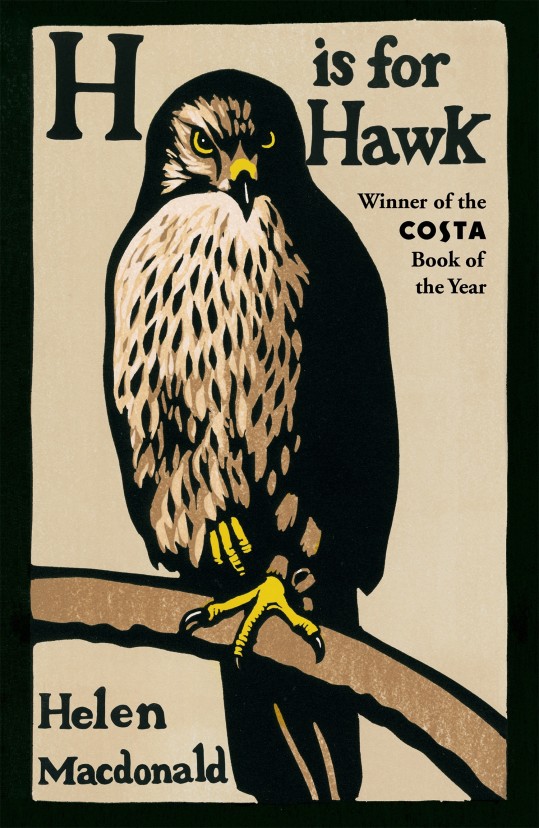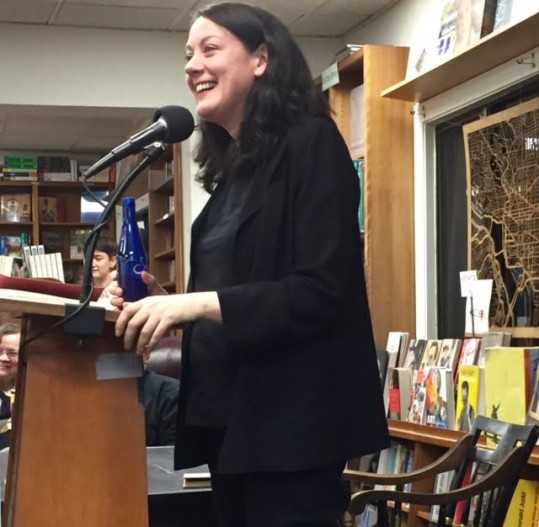Tags
"H is for Hawks", "Nother Was the Same", "The Year of Magical Thinking", A Best Book of the Year, goshawks, grief, hawks, Helen MacDonald, Joan Didion, Kay Redfield Jamison, Memoirs, T.H. White

(One of 10 Best Books of the Year, NY Times, Time Magazine, The Oprah Magazine, Library Journal, Amazon (20), etc., and also recommended by three MillersTime readers. Additionally, it was the winner of a number of prizes, including the Samuel Johnson Prize, the annual British prize for the best non-fiction writing in the English language and the Costa Book Award, one of the most outstanding books of the year written by authors based in UK and Ireland.)
I recently finished and was fascinated by the book H is for Hawk. Written by Helen MacDonald, it is a memoir about her grief at the loss of her father and the unusual way she ‘grieved’ in the year following his unexpected death.
Memoirs have always been a favorite form of non-fiction for me, especially well written ones, such as MacDonald’s. Generally, grief memoirs seem to take one of two forms: one written during the immediate time following the death of a spouse, parent, child, or friend or one written after the period of grief has passed. (One of my favorites of the first category is Joan Didion’s The Year of Magical Thinking. For the latter category, and even more a favorite, I have read and reread Kay Redfield Jamison’s Nothing Was the Same.)
Written five years after her father’s death, MacDonald’s memoir falls into the latter category and recounts the extraordinary period of time in which she both lost and found herself.
H is for Hawk is actually three interwoven stories. It recounts the famous author T.H. White’s unhappy and unsuccessful experiences in trying to train a goshawk; it recounts MacDonald’s experiences with training her goshawk (Mabel) and attempting to deal with her grief, and it also tells the story of Mabel.
Of the three narratives, I found myself only moderately interested in White’s experiences, although they do give a good framework for MacDonald’s own experiences. Nor was I quite as absorbed in Mabel and the intricacies of falconry as some readers seem to be, although that is a large part of the H is for Hawk. For me, the most fascinating part of the memoir was MacDonald’s struggles with her grief, how she handled (mishandled?) that, and what she did and didn’t learn about herself and about her loss of her father.
As I usually do, I will leave the details and discoveries in the book to those of you who may yet read it.
 I will add, however, that Ellen and I spent a wonderful evening last night at Politics and Prose Bookstore listening to and getting to know more about MacDonald. It was perhaps one of the best book talks we’ve attended. Within that one hour, we were treated to a wonderful summary of her book and numerous insights into MacDonald’s life, writing, and personality.
I will add, however, that Ellen and I spent a wonderful evening last night at Politics and Prose Bookstore listening to and getting to know more about MacDonald. It was perhaps one of the best book talks we’ve attended. Within that one hour, we were treated to a wonderful summary of her book and numerous insights into MacDonald’s life, writing, and personality.
Some things we learned in the question and answer period:
- Mabel has died. MacDonald now owns a parrot.
- MacDonald is not currently ‘falconying,’ although she hopes to have time to return to it in the coming year.
- Movie rights have been purchased to the book.
- MacDonald was shocked by the wide spread response and success of her book and never dreamed it would have interest beyond a small audience.
- It took her four days, which she described as very long, tiring, and emotionally draining, to make the audio recording of the book.
- Writing about Mabel, even though done five years after the events recorded in the book, was the easiest part of the writing for her (and her best writing in my estimation).
- MacDonald purposely left out the stories of her still living mother and brother, and even details about her father, as she didn’t want to tell their stories for them. The memoir is her story and her way to say goodbye to her grieving self.
- H is for Hawk is a “language centered” book, in MacDonad’s words and also her way of telling the world about hawks and falconry.
- MacDonald told the audience “Although they are killers, goshawks have no guile nor deceit and are honest and solitary.”
Much the same could be said of Helen MacDonald herself.


Emily said:
I’m so glad you shared this, Richard. H is for Hawk is on my list, and had I been in town, I’d have been at the P&P event.
One of my best friends lost her father 18 months ago, and her grief comes in unforeseeable waves. I’ve sent her this post as I believe MacDonald’s wrestle with her own grief and growth might resonate and comfort. Best, E
Lydia said:
Thank you for this review! I started reading H a few weeks ago and had to put it down for the moment. Her comments on needing to become invisible to train Mabel were too heartbreaking for my current state of mind…but I’ll pick it up again once that shifts.
Lydia
suzane stier said:
R,
I’m not sure if I sent you the recommendation. If I did, good for me. If I didn’t, my bad, as they say.
It’s a terrific read about something I would not have know about. The icing on the cake is her story about her grief. (And it’s written beautifully.)
Here’s a book that I’m almost done reading which is fascinating. It’s called Tuxedo Park by Jennet Conant. Non-fiction. About Alfred Loomis, millionaire banker turned scientist who bankrolled and supported the exceptional work done by physicists before and during the war(WW II). Radar, atomic bomb, and many other discoveries came from his lab in Tuxedo Park. When the government wouldn’t fund research, he did. I must tell you I don’t understand the physics and the read is wonderful without knowing all the science.
S
Tom Perrault said:
Interesting to read your blog piece. I purposefully did not recommend this book to you last year (we read it for our bookclub) because I didn’t particularly enjoy the book. It was…fine. A bit “meh”. And that was the overall consensus of the group, as well. I was a bit quizzical as to all of the praise it engendered.
That said, I went in to reading it with all of that praise in my head and so I had high expectations for it. Had I just randomly picked it up and started reading, I might’ve been able to enjoin the solitude and stillness of it and see it in a different light. But expectations being what they are….
I also suspect listening to her was very interesting and would’ve definitely given me a different lens by which to view the book.
Richard said:
T,
I think you are correct that seeing and listening to MacDonald helped the book. She came across as so genuine that that helped my feeling about the book. I agree that it was overhyped (can you over hype something?) and tried to include in the post that neither the T.H. White stuff nor some of the training interested me. Not sure I’ll put it on my top list for next year, but thought I’d write about it anyway. Also, she didn’t have as much insight into herself when she wrote it as I think she does now. But that may be true for all of us.
I did leave out, unfortunately, some of my thinking about seeing a writer and/or knowing a writer and what that does to one’s evaluation of a book. I tend to like it when I see someone who has written a non-fiction book (after I have read it). When I know the author, particularly if he/she is a friend, all my critical faculties go out the window.
Thanx for Commenting.
Richard
Land Wayland said:
Just finished H is for Hawk and I have dipped back into it about a dozen times, simply opening it to random places and re-reading 8-10 pages. It is a book I will continue to read and reflect on for several years.
I concur with the comments about the T.H White portions of the book….As much as I loved his telling of the tales of Camelot, I was much less impressed with the story of his erratic psyche. I would have preferred to hear more about what other Gos Hawk flyers have said through history and leave this wretched soul standing at the foot of a tall tree whistling lamely.
And I was not able to identify with the author’s deep distress over the death of her father. There are issues there that she just couldn’t reach, let alone deal with. That his death deeply distressed her, there can be no doubt. But despite her best efforts to explain, I just could not feel what she felt.
BUT it is her musings on learning to be wild, and learning to live through the eyes and mind of a wild creature that is the treasure, both because of how clearly she relates how she did it and how it affected her. And this is clearly the best part of the writing because it is the part that she is most interested in and because of her writing style. which is patterned after her goshawk. Terse. Direct. Spare. Tough. Unflinching. Relentltless.
Blood, bruises, cuts and pain are here but so are deep forests, rainstorms and blue skies and high branches and many other wild animals, and small daily adventures, and suspense and how-I-did-it and hard earned victories by both wild things. It is full and rich and about much much more that a big bird.
She comes the closest to anyone I have ever read to explaining how our hunting ancestors must have lived and thought and didn’t feel as they went about their daily business of hunting and killing their daily food every single day. And her writing about this is the best personal writing about any subject I have read in several years.
Forget the reason she bought and trained her Hawk. Forget the emotional roller coaster of losing her father, her job, and her place to live and all the other stuff that frames this story and give yourself over to the central picture of feeling deeply what it means to be a hawk in the countryside of England and then, having done that, what it means to return to being a different more human person.
Mabel died (all hawks do) and cannot be replaced because this is truly a “Been there, done that” story and could not possible be re-lived. Buying a parrot would seem to indicate that she wants to hear directly from the source and not have to rely on mental telepathy as she and Mabel did repeatedly.
Writing and presentations 5/5. Content T.H White 3.8/5, Grief Processing 4.2/5. Training and then becoming/unbecoming a goshawk 5++/5.
Richard said:
L,
As is often the case, you capture much of what I was trying to say.
I was in fact disappointed at what I felt was her in ability to understand her grief while fascinated by her understanding and portrayal of Mabel (as you so aptly describe it).
I do think seeing and hearing her added an important piece to what was not in the book or perhaps was only evident to her after finishing it and thinking back on that year and a half.
So appreciative of your contribution.
R